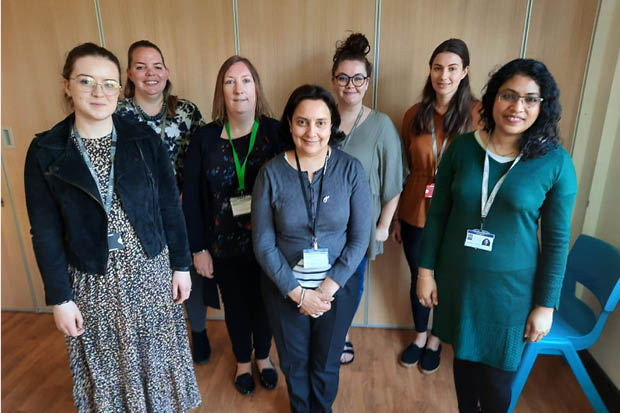The Social Workers in Schools team at Harrow Council has been in place since September 2020, set up in response to the growing needs of young people in schools.
Here, team member Caitlin Neal shares her experience of the role so far as well as the wider work she has been part of to support the wellbeing of social work colleagues in Harrow.

Growing up, I had always wanted to be a primary school teacher, but at the end of high school, I was drawn to social work. I’m from a rural community in Australia and have always felt passionate about the rights of Indigenous Australians. On top of this, my mum is a midwife and I have a cousin who is a social worker. They both started talking to me about the social work profession, which led to me completing a 4-year social work degree. I practiced in Australia for a year before relocating to the UK. This month marks my 5th year working in Harrow.
Social work in an educational environment
The aim of the Social Workers in Schools programme is to strengthen pastoral support in school settings; provide advice and support to students, parents and staff; support earlier identification of children requiring social work intervention; and through this, facilitate better relationships and improve outcomes.
As someone who once wanted to be a teacher this combination is a great fit. Our role in schools is new and we’ve had to establish ourselves and our responsibilities, from running anxiety groups and seminars to writing newsletters about domestic violence and working with other services, such as Safer Schools Officers, School Nurses, Mental Health Practitioners and Early Support Teams - to name a few.
Everyone in my team has different experiences and expertise, so it’s important for us to communicate and ask questions. Most of my experience comes from the Children in Need (CIN) team so I’m there to offer help with the longer-term casework.
As a social worker, your responsibilities are split with the teachers, school counsellors, and others, so you all have to work closely together. I’ve found there is a role to play in helping teachers understand the roles and duties of social workers. It’s important to make sure schools know what’s available.
Our team holds a smaller number of cases than you usually would in the CIN team for example. The rest of your time is spent working with children and families who might need some help. Students and teachers can come and find me; I run virtual drop-ins for parents where I share advice. Issues might range from a child experiencing anxious feelings to a young person self-harming. I can encourage parents to go on walks with their children, establish boundaries when it comes to using technology, or in more serious cases, advise the parents of young people experiencing suicidal ideation. I also provide support for other members of staff in school, including Designated Safeguarding Leads.
Mental health isn’t just important for the families we support
Whilst my day-to-day role supports the mental health of young people and their families, I also play a part in supporting my fellow workforce. In team meetings and service forums, Harrow Council has invited speakers from within the workforce to discuss emotional wellbeing and self-care.
I chose to deliver a session on reflection and self-care, focusing on:
- Reflections on the pandemic and how this might have affected us all individually, such as feeling lonely (even if we are connected electronically to family and friends), anxiety at reading the news, and feeling pressured to be productive or make this time count.
- Healthy coping strategies, such as positive thinking, healthy eating, and hobbies, before having everyone try various exercises including breathing, mindfulness, muscle relaxation and reflexology.
I also spoke about things that I do for my own self-care (such as reading and craft) as well as what I struggle with (eating healthily, exercising, and putting pressure on myself to be productive in this time).
Following this work, an adapted version of the presentation was recorded and shared with students at the school I am assigned to, with the aim of educating students about the importance of their wellbeing, healthy strategies, and where to access support.
Everyone needs time during the day for self-care
I’ve had positive feedback from both social workers and young people on the presentation and exercises I shared. As a social worker to her peers, I was able to recognise the struggles that our working life can present. We often don’t think there’s time for self-care and working from home means that there are blurred lines between the personal and professional. It’s easy to slip into working longer hours and not having breaks from the screen, but we need the emotional space to focus on our wellbeing.
That’s why it’s important that managers continue to encourage open communication regarding their teams’ feelings and wellbeing. This will help to ensure the retention of social workers, including during Assessed and Supported Year in Employment (ASYE), and keep caseloads at an appropriate level.
I’m not an expert but I know that the time I dedicate to self-care is invaluable. It might be something simple like ensuring I have a lunch break, going for a walk, or attending a webinar. Though I’m still trying to include more exercise in my daily life, after open and honest conversations with colleagues, I feel more motivated than ever to make positive changes - I remember being so inspired after our wellbeing forum that I exercised for an hour!
The Social Workers in Schools Programme, placing more than 140 social workers in schools in 21 local authorities around England, has been extended to March 2022.
Find out more about its scale-up, which began in September 2020, at the What Works for Children’s Social Care website.
Leave a comment